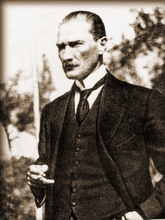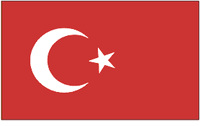Following up on the fact that Turkish does not have a separate verb "to be," Mary asked this: how would you translate Hamlet's famous line
"To be or not to be?".
This good question reminds me of efforts to translate any classic literature into a language other than the one in which it was originally written. For example, check out this heartfelt/içten review of Edmond Rostand's great play
Cyrano de Bergerac. In it, the review's author, Jonathan Yardley, touches on how hard it is to translate a literary work of art. He gives proper credit to Brian Hooker for bringing to the English-speaking world the magic of Cyrano.

Years ago, I was given the same tip about Cyrano—"Make sure the Cyrano play is based on the Hooker translation!" Apparently, lesser translations deprive you of the full spirit of the Frenchman's achievement.
That said, I approach the idea of translating even this tiny fragment of the great William Shakespeare with reverent caution.
First, though Turkish has no separate verb "to be," it does have the means to express the concept, as Barry showed in his comment on my
Decartes post. It's just not a literal translation.
Therein lies a key lesson I'm teaching myself—try to capture the spirit of what's being said, not a verbatim, word-for-word translation. As in everything I do, reality is my guide. It comes first, language second. The latter is a tool to help me hold on firmly to the former. And, as I continue to discover, learning an additional tool like Turkish, is helping me even more to stay happily anchored to reality.
So, taking all this into account, what would be an appropriate translation of Hamlet's famous phrase?
First, I'll make a philosophical observation. To be is to be something. Attributes are attributes of some entity in reality. They don't exist apart from what gives rise to them in the first place.
Am,
are,
is are all different parts of the English verb
to be. What is Hamlet really talking about? Translating that, first, into prosaic English, he's saying "To be...a living man or to be...worm food" or "To live or not to live."
That said, my
prosaic translation is as follows: "Yaşamak, yaşamak değil." Yaşamak means to live. Değil means not.
Now, I'm being literal here, of course. Knowing that, I stand especially ready and willing to be corrected.
Another reason why I'm tentative about this prosaic translation is this—my textbook describes the use of değil in the context of transforming a noun or an adjective into a negative. I haven't seen it applied to an infinitive yet.
Scholars, weigh in, lütfen!



